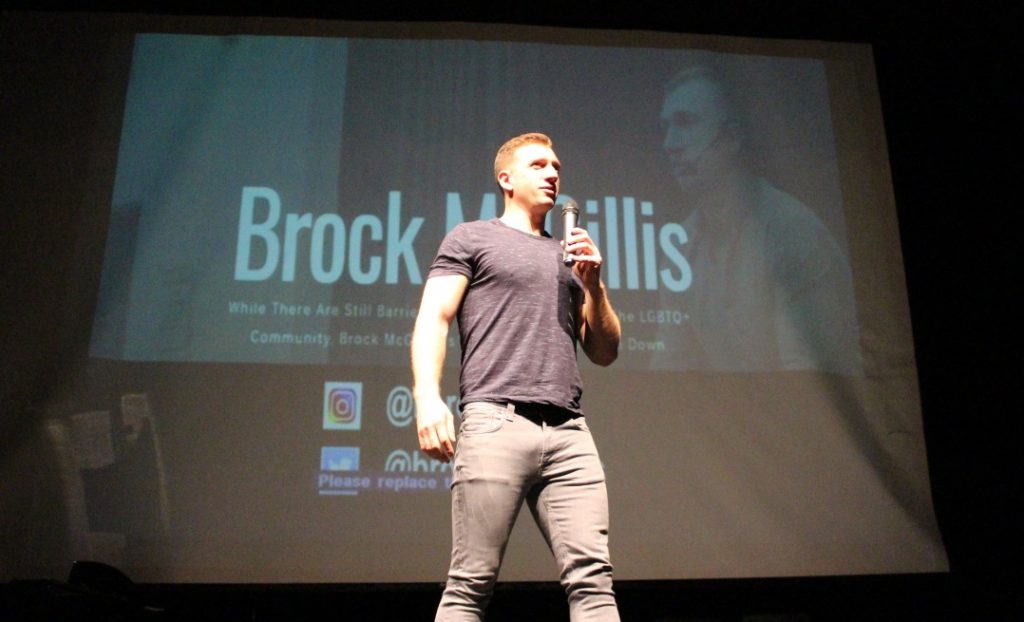Brock McGillis: ‘Hockey culture needs an overhaul’

Through sharing his personal story and speaking up for those yet to find their voice, Brock McGillis is shifting the sport he loves on inclusion. He just wants hockey to be more proactive, as he tells Jay Forster…

Jay Forster is a freelance journalist who has been covering LGBT+ stories in ice hockey since January 2020.

His personal story was featured by Sky Sports in the build-up to Pride Weekend in the Elite Ice Hockey League last year.
So far in this series of exclusive hockey interviews running on Sports Media LGBT+ throughout LGBT+ History Month, Jay has spoken to Kurtis Gabriel, Zach Sullivan, and Jessica Platt.
In this fourth feature article, he chats with Brock McGillis, who publicly shared his story of being a hockey player who’s gay around four-and-a-half years ago. Now 37, the Ontario native has become one of the sport’s most authoritative voices on LGBT+ inclusion and mental health.
Brock’s story contains references to both addiction and suicide.
Of all the articles I’ve written this month, of all the people I’ve talked to about their journeys, this one was the hardest.
Brock McGillis is maybe the biggest LGBT+ name in hockey. In 2016, he came out publicly, and changed the face of queer rights in men’s hockey.
But for him to get to that point, he had to overcome almost 20 years of hockey culture, and learn how to exist outside of that world.
“I first knew, I think, when I was seven or eight years old,” McGillis says, when I ask how early he knew he was gay.
“I remember a few years after that, my parents were watching the movie Philadelphia, and I asked my parents – what if I was gay? And they said that if I was gay, I was gay, they would love and accept me.”
McGillis went to his room that night and cried. That would have been in the mid-1990s. Between that night, and McGillis’ coming out nearly 25 years later, he played for five different teams in four different leagues.
He was drinking every night. He tried to kill himself. From the age of 15, through to his retirement in his late 20s, he suffered a season-ending injury every year. “There was so much psychological trauma, that my body was just failing on me.”
McGillis was playing in the Netherlands when he was 23, for the Duindam Wolves – a far cry from the NHL, where he was supposed to be playing. McGillis had been a highly ranked prospect for the OHL, before his injuries derailed his career progression. “I sat myself down, and I realised that there were two things that could happen.
“My career was over. I wasn’t going to make it to the NHL, from where I was right then. And the other thing was that if I didn’t get my shit together, I was going to end up dead.”
The suicide rates for young LGBT+ people today are frighteningly high. In 2006, they were even more so. McGillis had no support system for his sexuality. He had nowhere to turn, especially not out in Europe, away from his family.
He ended up looking at an online dating site for gay men, and realised that all the options in his hometown of Sudbury, Ontario, were men who were in public relationships with women. He didn’t want that to be him, in 10 years’ time.
He went back to Canada, and started a relationship with a man from Toronto – a much bigger city than Sudbury, which is home to only about 150,000 people. “I thought this would be it,” he says, discussing his first real relationship. “I knew who I was, I knew I was gay, I could have hockey back, I could get my life back, but that didn’t happen. It got worse.”
McGillis was with his boyfriend for three years. During that time, he never told anyone. He had an alias that he used with his boyfriend’s circle of friends, so they wouldn’t be able to Google him. It was just another part of his life that he had to hide.
McGillis never played another game of professional hockey after his time in the Dutch league. “I was putting myself first. I didn’t feel like I could be both, so I chose myself over the sport.”
He ended up moving back to Sudbury, and worked with youth hockey teams there as a goaltending coach, starting his own business. He didn’t plan to come out, but, as it usually does in small towns, people started to notice.
One of his students’ mothers tried to set him up on a date with someone called Steve. His students would apologise for homophobic language. One of his students, then an OHL player, even made a younger player do push-ups for using the word ‘gay’ as an insult. Slowly, slowly, things were changing for the better, in this small bubble of Canadian hockey culture.
An advocate for authenticity
In June 2016, a man entered Pulse nightclub in Orlando, Florida, with a gun, and murdered almost 50 people. That was the catalyst for McGillis. He called a friend of his, who was working for Yahoo Sports at the time, and that was it. He came out only weeks later. He received over 10,000 messages on social media the day the article was published.
Was there ever a point at which he felt like he could have come out while he was still playing?
McGillis laughs without humour. “No.” Homophobia and transphobia runs rampant through hockey, from the NHL all the way down to major junior and under. That’s how it was back then, and that’s how it is now.
McGillis has worked most notably with the Erie Otters to try and engage with this aspect of hockey, but for the most part, he doesn’t think anything much has changed since he played in Sault Ste Marie and Windsor in 2001.
“It’s just reactionary,” he says, on being invited to talk to teams. “If there’s a sexual assault, then they bring someone in to talk about it. If there’s a suicide, they bring a mental health expert in.”

Finally, he gave up. The OHL wasn’t willing to pay him for his time, and they refused to make it mandatory for players, so McGillis stopped going.
It’s an echo of what happened during the playoff bubble in the NHL. When the NBA refused to play their games to protest the murder of George Floyd, the NHL did nothing – until the backlash on social media forced their hand.
The NHL refuses to be the first one to do anything, and they always end up reacting. “It’s a slogan,” McGillis says, of ‘Hockey Is For Everyone’, or the #WeSkateFor movement, which equated black lives to the ‘Storm Surge’, the notorious post-win celebration of the Carolina Hurricanes.
“The culture is broken,” McGillis continues. “It needs an overhaul.”
McGillis believes there is hope, however. Hockey prides itself on a feeling of community. Teams pride themselves on being a family. When the Humboldt Broncos bus crash happened, the hockey world came together. When a young person has cancer, the hockey world comes together. “Hockey players want to rally, and we need to show them that this is something they need to rally around.”
The NHL isn’t ready for an out gay player. Major junior isn’t ready for an out gay player. But with McGillis and the people like him, maybe one day there will be. Instead of ‘You Can Play’, it’ll be ‘I Can Play’.
So, any advice for queer kids playing hockey? “There are people out there that you can turn to. We can help you. But I would also tell them that you don’t need acceptance from anyone but you.
“Fuck looking outwardly for acceptance, because the only person that can accept you is you. If you’re looking out to straight people for acceptance, you haven’t accepted yourself. And then you have to learn to love yourself.
“In interviews, I say this all the time – I love being a gay man. And that’s not something that a lot of queer kids have heard, sometimes, but I wouldn’t trade this life to be a straight man. When you love who you are, you won’t care what anyone else thinks, and that’s the most powerful feeling in the world.”
Follow Jay Forster on Twitter at @jaythegoalie.
Further reading…
Kurtis Gabriel: ‘The NHS needs to get uncomfortable’
Zach Sullivan: ‘Other LGBT+ athletes will support you’
Jessica Platt: ‘My team-mates told me they were proud of me’
Sports Media LGBT+ is a network, advocacy, and consultancy group that is helping to build a community of LGBT+ people and allies in sport. Learn more about us here.
Read about our support for LGBT+ History Month in February.
LGBT+ or a strong ally in sports? Your story could help to inspire other people – you don’t have to be famous to make an impact, and there are huge gains to be made both personally and publicly. Start a conversation with us, in confidence, and we’ll give you the best advice on navigating this part of your journey.
Email jon@sportsmedialgbt.com or send a message anonymously on our Curious Cat.


